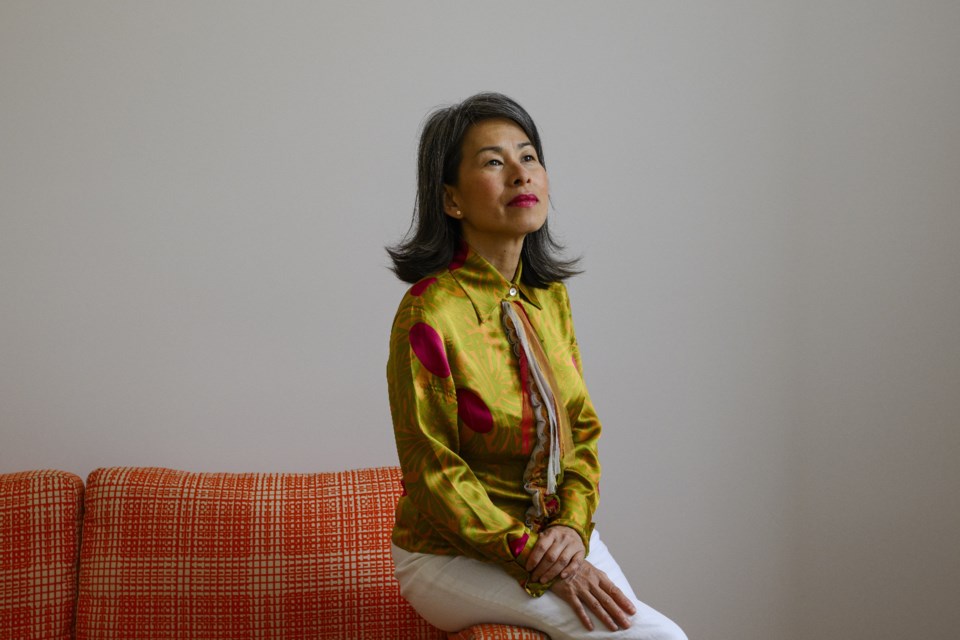TORONTO ŌĆö A big-screen adaptation of Kim Th├║yŌĆÖs autobiographical novel ŌĆ£RuŌĆØ had the author revisiting sometimespainful childhood memories of fleeing Vietnam but she says it was ŌĆ£a privilegeŌĆØ to do so through the eyes of its young star.
Th├║y says she found the dramatization jarringly realistic in its depiction of her early days, with the Montreal set's period-specific production elements including a reconstruction of the home she left in Saigon, now known as Ho Chi Minh City.
"It was so real ŌĆō so true ŌĆō that it became unreal. You walk onto the set and you recognize the house. But this no longer, you know, doesn't exist anymore," Th├║y said during a round of interviews when the film premiered at the Toronto International Film Festival in September.
"And not only the house or the decor, but also the smell ŌĆō it's also the humidity of Saigon. When it's minus 20 outside and inside we really felt like we were in Saigon."
The filmŌĆÖs director says props included wood panels and a desk Th├║yŌĆÖs family brought with them roughly 45 years ago as part of a perilous postwar exodus of refugees famously dubbed the ŌĆ£Boat People.ŌĆØ
But especially enlightening was the discovery of an interview Th├║y and her family did with a local Quebec TV station, says Charles-Olivier Michaud.
"I know how she speaks, I know how she dressed," says Michaud.
"It was her father, her mother, the sponsors were there. It was so enlightening.... The costume, the art direction, we all fed on that."
Adding yet another layer of authenticity were the life parallels for its young star, Chlo├® Djandji, who, like Th├║y, left Ho Chi Minh City at age 10 for Quebec in 2020.
Th├║y fled in the wake of war while DjanjiŌĆÖs family left amid the COVID pandemic, but the similarities allowed them to ŌĆ£meet emotionally,ŌĆØ says Th├║y.
ŌĆ£She understood the book very quickly, or she understood the panic ŌĆō of us, of me ŌĆō leaving Vietnam,ŌĆØ says Th├║y, who worked as a seamstress, interpreter, lawyer and restaurant owner before becoming a celebrated author.
Seated beside Th├║y, the 13-year-old Djandji agreed but noted several differences that required some imagination on her part: while a young Th├║y struggled with English and French, Djandji went to a French school in Vietnam and also spoke English before moving to Montreal. Before moving, Djandji had also visited several times to see her grandparents and even had friends in Quebec.
Still, Djandji says it wasnŌĆÖt hard to imagine what it would have been like under different circumstances.
ŌĆ£I could understand how you were so scared; the integration was hard,ŌĆØ she says, turning to Th├║y.┬Ā
Th├║y has high praise for the budding actress, stating ŌĆ£she just slipped into it perfectlyŌĆØ and Th├║y knew from the first audition that Djandji was right for the role.
ŌĆ£I consider this a privilege to live those moments once again, right? Because usually you cannot go back in time. But this time I went back in time through Chlo├®,ŌĆØ says Th├║y.
ŌĆ£She had to be me at the point where I didn't speak French, I didn't speak English and I was very shy. And then here, Chlo├® gave those emotions right back to me.ŌĆØ
Even though she is the lead, Djandji says she didnŌĆÖt have many lines in the script and had to express a lot of what her character experienced through physical gestures and facial expressions.
ŌĆ£The hardest thing that I did was trying not to smile. Because I'm a very smiley girl," she says.
"Through the audition, you can always hear Charles-Olivier say, 'Stop smiling. Stop smiling.'"
The journey from book to screen was a long one, says Th├║y, who ŌĆ£never thought it was a possibility.ŌĆØ
She still marvels at publishing the 2009 book that spawned the film, noting that it started when she shared her early notes for ŌĆ£RuŌĆØ with a former customer of her restaurant, who was a film producer.
She says that producer, Andr├® Dupuy, took it to a publisher and also bought the rights for the movie.
ŌĆ£I didn't know what he meant by buying the rights. I said, 'Yeah, yeah, right.' I thought it was a way for him to give me money because he knew that I lost a lot of money at the restaurant,ŌĆØ she says.
ŌĆ£I said, 'You don't have to give me money, I'm OK.' And he said, 'No, no, I really believe in this. We could make a movie.'"┬Ā
Th├║y also calls it a privilege to publish the book and speak on behalf of "those who we very often forget to talk about."
ŌĆ£For the same reason, I hope that the movie will give us all an opportunity, again, to speak and talk about those who arrived here,ŌĆØ she says.
ŌĆ£Because it's so difficult. There's so many, so many challenges. We forget how hard sometimes, but at the same time, (this can) remind all of us that we are capable of welcoming these new immigrants and help these new citizens take roots in a new territory, and how to offer our culture to those who are arriving in this new land."
"Ru" opens in select theatres Friday.
This report by The Canadian Press was first published Jan. 24, 2024.
Cassandra Szklarski, The Canadian Press



